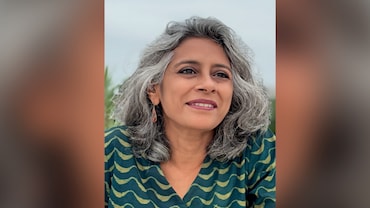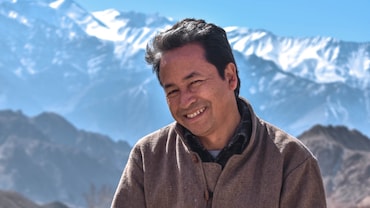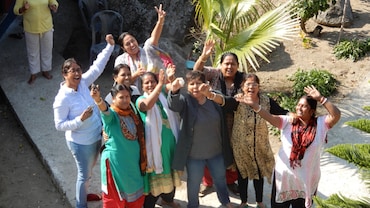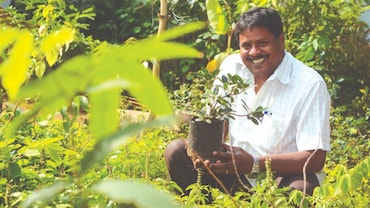- HOME
- /
- Features
- /
- Personalities
- /
Once A Child Left For Dead, Now An Award-Winning Author: Manoranjan Byapari's Remarkable Life
Manoranjan Byapari’s life is an astonishing survival saga
 Manoranjan Byapari, a symbol of subaltern dissent (Photograph by Vikram Sharma)
Manoranjan Byapari, a symbol of subaltern dissent (Photograph by Vikram Sharma)
January 2018, Chennai. The stage is set for The Hindu Prize 2018 for non-fiction. Five outstanding books from over 500 entries have been shortlisted. Each of the authors is widely celebrated, barring one. So when the outlier’s work, Interrogating My Chandal Life—An Autobiography of a Dalit, is announced as the winner, it is a moment in Indian literary history. Receiving the award, author Manoranjan Byapari, now 69, normally tenaciously unsentimental, breaks down into his gamchha, which he wears around his neck as a symbol of his identity. Many in the audience, his wife Manju among them, struggle to fight back tears. “The joy is not mine alone, but that of all those who are hated and discriminated against. The respect I received here made me cry,” Byapari said later.
 Byapari breaks down as he receives the 2018 Hindu Prize for non-fiction.
Byapari breaks down as he receives the 2018 Hindu Prize for non-fiction.
***
Byapari was born in 1950 into a family of fisherfolk in the lush Barisal district (in today’s Bangladesh). As namashudras, the lowest rung of the Dalit people, his family had little to lose, but the derangement of Partition took their home as well. The Byaparis were herded into a truck, along with at least 30 other families, and transported to refugee camps in the badlands of West Bengal. Memories of that terrifying journey—being bumped around in the vehicle in the searing heat, the air clouded with red dust from the tracks, a baby being born en route and an old man dying on the truck—were burnt into the brain of the 4-year-old.
Upper-caste people were provided land after Partition, but Dalits were thrown into camps. Shiromonipur, in Bankura, was like a prison camp, only with dole. The refugees were randomly shoved into furnace-like canvas tents. “The rice we got had a disgusting sour smell and caused widespread dysentery,” Byapari recalls. “Every night, there were babies dying. It’s impossible to forget the loud wails of grieving mothers and the small pond close by, where dead babies were cremated. The fire never quite died down—the smoke from the pyre blew over the camp.”
As an infant he was also infected. “I died one night. And my body was supposed to be buried the next morning. Somehow, I started showing signs of life when day broke.”
Ever since, his life has been a scramble for survival. As a teenager, he got sucked into the Naxal movement, channelling his rage towards armed struggle. Walking the thin line, he veered into a life of crime. In and out of prison, over the years, he worked in a crematorium, as a cook, a coolie and a rickshaw puller. Chance encounters helped Byapari drag himself out of the subhuman life of a chandal (corpse burner) to pursue learning and wisdom. He would target his pent-up rage to speak out against upper-class tyranny. He would dip into his well of lived experiences to chronicle the unwritten histories of the Dalit people, and, finally, become a symbol of subaltern dissent.
***
Untouchability, and the stigma of caste, were drilled into Byapari as a child. “In the camp we were all namashudras, but never noticed it. Later, when I grazed cows for a Brahmin home, I was shown my place as a human. They used to pour dal into my misshapen food bowl from a height. They would kiss a dog, but weren’t willing to touch me”.
By the time he was 10, his father had developed ulcers out of persistent hunger, and his little sister died of starvation. “We had no clothing, used mud to wash our hair and lived in a hovel. My mother used to wrap a mosquito net to cover her body. I realized I too would die—we all would—if I didn’t escape, so I ran away,” says Byapari.
He landed up in Kolkata, and then in New Jalpaiguri and Assam, where he worked in tea shops and dhabas. Tea shops, and their chatter, were like a library for him as a boy, Byapari says. “I learnt about the Naxalbari movement there and recognized that the Naxals were exactly like me, their battle was also against hunger. All year I would work hard, but then had to hand over my earnings to the owner and stay hungry. What kind of justice was this? Their battle was my battle.”
He left his job and wandered through east and north India. “During this time, I grabbed food from dogs’ mouths, picked at dumpsters and followed around beggars in hunger. One thing was clear: No matter where you are in India, there are people who go to sleep hungry.”
He returned to Kolkata and, incredibly, found his family, who were overjoyed to see their lost child. Meanwhile, the Naxal movement had intensified further. A row between the CPI(M) and the Naxals over a wall-writing issue landed him in trouble, even though he was just a sympathizer at that point. “The actual offender got away—being from a poor, low-caste family, I was easy prey. Battered body, broken legs, even though I kept saying I was illiterate, I could not write.”
As it happened, his story reached the ‘real Naxals’ and they got in touch, asking him if he wanted revenge. He was given medical treatment and handed a pipegun, bomb and knife, and a new chapter began.
At night, Byapari played Robin Hood. “I was a brawler, alcoholic and antisocial in the eyes of the public and police. But those who had nothing, especially the women who came to the city as domestic help, considered us their protectors,” he says. One of the vulnerable women he saved from thugs, a girl named Manju, later married him.
This life was also the shortest path to Alipore Special Jail, where his life took a U-turn. A man of around 60, who everybody called Mastermoshai, was lodged in the same prison wing as Byapari. Mastermoshai took a shine to the young jailbird and tried to convince him to start reading and writing, but Byapari was not interested.
One day, Mastermoshai called young Byapari to a window in their ward. Across the road, he pointed to a small green shoot sprouting out of the National Library wall. The shoot got no moisture or nourishment, yet it grew out in defiance. Mastermoshai asked the young prisoner to reflect on it. “This is our life,” said Mastermoshai, “it’s possible to find sustenance, if you look for it.”
On another occasion, Byapari encountered a good-looking young man in the jail asylum who said he had been turned in by his mother. Apparently, he had lost his mind reading Sarat Chandra’s Charitraheen. When Byapari asked Mastermoshai how this was possible, his teacher said: “How would you know what a book can give a man? Go peel potatoes ... ”
“The next morning I felt a strange turbulence within, and a change of heart. I told Mastermoshai I wanted to read and write. We got down to it straightaway: A twig was my pencil, the jail courtyard my slate, Mastermoshai was my textbook.”
***
Starting with the Bengali alphabet, Byapari progressed to words, and eventually to books, and discovered an insatiable hunger for literature. There was no library in his jail, but somehow he was able to access them through his Naxal friends. The more he read, the more he evolved, and a new person started taking shape. By the end of his sentence, he had tremendous goodwill in the prison.
Out of jail, he worked as a rickshaw puller, but his passion for reading had gripped him further. “All I wanted to do was read more books,” he says. He scoured through scrap dealer stocks for old books and magazines. He read classics and pulp fiction, devouring whatever he got his hands on. While he joined a local library, many of his passengers, thrilled to know about his reading, passed on old books—Gorky, Dostoyevsky, Rabindranath, Sarat Chandra and the The Red Book. “I went from the Himalayan peaks to the bottom of the desert, voyaged in space to the deepest forests and became a globetrotter, even though I was only a rickshaw puller,” says Byapari.
The world of Bengali literary fiction, especially that created by Mahasweta Devi and Chanakya Sen, amazed him. “In the Pita Putra books, by Sen, I had tripped on the word jijibisha. I just could not find the meaning anywhere. One day, I had a passenger—looking at her I figured she could be a professor, as she had taken the rickshaw from Jyotish Roy College, and so might know what the word meant,” recalls Byapari.
It was late afternoon in June and the sun was breathing fire. The passenger unleashed a barrage of questions: Where did you come across this term? How far have you studied? What books have you read? He named quite a few books, among them were Mahasweta Devi’s Hajar Churashir Maa and Aranyer Adhikar. “I edit a literary magazine—will you write for me?” the woman asked. Byapari had already read some 400 books, but he had never written a single line until then. He told her this, asking her for her address. “When she shared her name and address, I was amazed—she was Mahasweta Devi herself! I showed her the copy of her book I was reading and she gave me a big hug,” recalls Byapari.
 In a strange, and joyful, coincidence, Byapari met his literary mentor Mahasweta, as a rickshaw puller in Kolkata.
In a strange, and joyful, coincidence, Byapari met his literary mentor Mahasweta, as a rickshaw puller in Kolkata.
Byapari started visiting Devi, who soon became his literary mentor. “I tried for a month to write my story and ended up wasting a lot of paper. My writing was terrible—I couldn’t read it myself,” he laughs. But in the end, it was published in Bartika magazine titled Rickshaw Chalai [I am a Rickshaw Puller]. And so, a writer was born.
Byapari has written 16 books and numerous social and political essays. Much of his fiction is inspired by his own experiences, and peopled by characters he has encountered on his remarkable journey. Says Arunava Sinha, translator of There’s Gunpowder in the Air: “Byapari has an extraordinary empathy with everyone he saw struggling to survive, just like himself. He could have foregrounded his own unique experiences in all his fiction, but he chose instead to tell the stories of these other people, united in that they were all victims fighting back and refusing to surrender.”
Byapari’s political thinking is informed by his activism, not just in Bengal but his work in Chhattisgarh with Shankar Guha Niyogi, the legendary trade union leader, who became his political mentor in the ’80s, when he moved to the area.
Byapari has battled on relentlessly, through his writing, against Brahmanvad and Manuvad, not to mention the oppression, violence and injustice against his people. He has spent the past four decades, bringing to the fore their untold stories, which would otherwise have been lost.
You hear despair in his voice, talking about the current socio-political climate: “Even through years of Communist rule in Bengal, the scourge of casteism remains insidious … All these years of work of rationalism and scientific progress have been negated by regressive forces in one sweep. We have fallen back by hundreds of years.” Yet, not one to be defeated, he calls himself a lekhowar, one who has weaponized his writing, and uses the fierceness of his prose to fight back.
When Amazon Westland launched their language imprint Eka, this year, their goal was to publish great writing in Indian languages apart from English and take them to a wider audience. Says Minakshi Thakur, publisher, Language Division: “Byapari is a writer who must be moved from the sidelines of publishing to the mainstream. His ideas about caste and inclusivity, about home and identity, nation and borders, must be heard by readers across states, especially the youth. They are relevant now more than ever in our current political climate. His writing stems from deprivation, rage and isolation; it is raw and uncoloured by training. And most importantly, he speaks about a world he has seen and lived in a world which isn’t a fair one.”
 (Clockwise from left) Byapari at his writing desk; receiving the 2019 Gateway LitFest Writer of the Year award from film director Adoor Gopalakrishnan; speaking at the Jaipur Literature Festival, 2018 (Top left image courtesy Subir Halder, India Today)
(Clockwise from left) Byapari at his writing desk; receiving the 2019 Gateway LitFest Writer of the Year award from film director Adoor Gopalakrishnan; speaking at the Jaipur Literature Festival, 2018 (Top left image courtesy Subir Halder, India Today)
***
Amazon Westland has acquired the rights to 14 of his books—novels, short stories and memoirs. These will be translated and published in English and seven languages over the next three years. This has provided succour to Byapari and eased his financial stress somewhat. While he used to spend 12 arduous hours, every day, as a cook at a local school for the deaf until last year, now he is hoping to get a relatively comfortable office job instead. He has been making appeals to the government to make this possible.
Byapari lives with his wife and son Manik in Mukundapur, on the southern edge of Kolkata, and is currently busy rebuilding his old home, which is a dream come true. His daughter, named after Mahasweta Devi, is married and a working woman. Manik is settling into a career. “I am grateful to Manju for everything—she kept our hearth burning, while I fought my battles,” says Byapari.
Today, Byapari travels around the country captivating audiences in literary forums everywhere. At home he can be seen most often typing energetically into his laptop, his incandescent rage staying alive in defiance and courage. “From a person, I have become a subject. I want to take my story far and wide. Many, many people can get the energy to fight their battles, that way,” says the writer, warrior.






